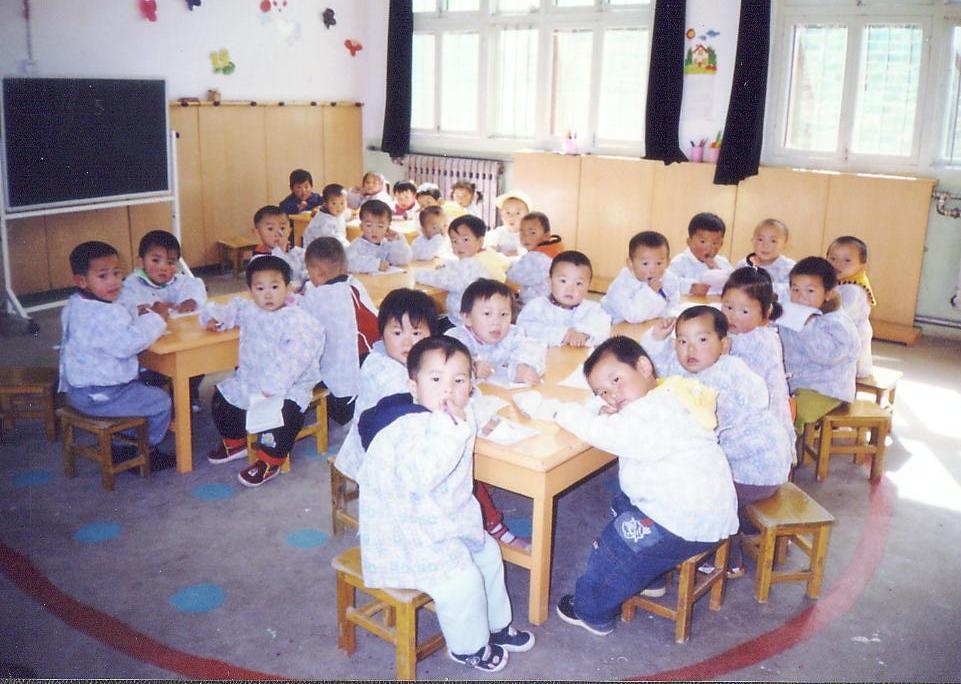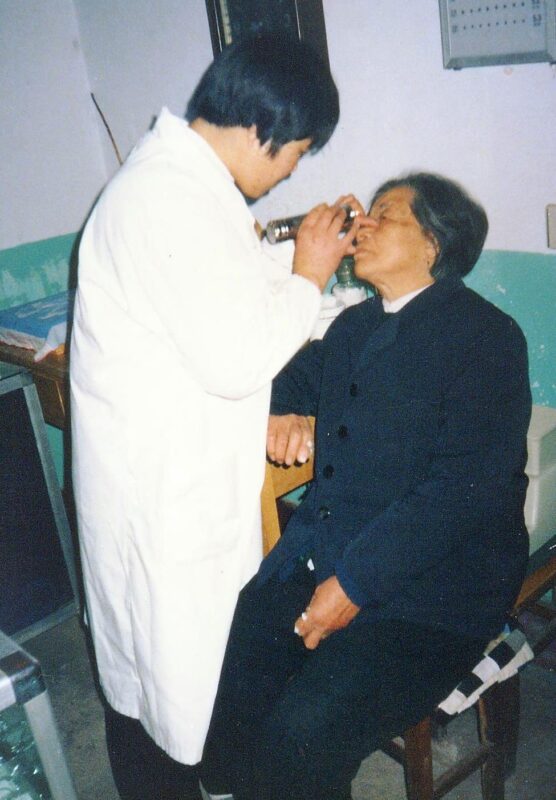
China Bridge (神州橋樑)_2007/Jul
Quiet help amid the noise and suffering
“If it bleeds, it leads,” is a slogan in the news media. The lead story on the television news and the top story on page 1 of the newspaper usually reports disasters or tragedies. A steady diet of bad news is more than many people can stomach, so they stop following the news and retreat into their private worlds. Someone called this the Mean World Syndrome: people conclude that the world is mean, wicked and becoming increasingly worse. Thus they lose hope.
Yet good things happen in every country in the world. With or without news coverage, people are helping people. In China, Catholics are only one per cent of the population, and Protestants comprise only three or four per cent, yet they contribute to the common good more than their numbers would suggest.
Ants can slowly eat a bone
Big problems can often be solved through small, persistent means. “Ants nibble a bone” (蟆蟻啃骨頭), is a Chinese saying describing a team doing a big job bit by bit.
A generation ago, after the Oil Crisis of 1973, an energy expert said, “ Don’t look for one big solution. Instead, look for a hundred one-per cent solutions. Turning off lights when leaving a room can save one per cent, lowering the air-conditioning, one per cent, combining trips when driving, one per cent, windmills, one per cent …”
Little things add up. People used to say, “It is better to light one little candle than to curse the darkness.” Today it might be better to abandon grandiose claims to banish darkness everywhere and instead to let our limited light shine where it is most needed.
Literally, this means reducing the wattage of outdoor lighting and turning off indoor lights after business hours, which will reduce fuel consumption and hence air pollution. Figuratively, this means noticing poor and marginal groups, and focussing on their suffering.
The Chinese government no longer claims to be able to do everything for everyone. Needy individuals can fall through the cracks and disappear from view. So there is room for private donors, corporate philanthropy and religions to help those in need.
Examples of Catholics helping
To give three examples, Catholic religious sisters in China, staff eye clinics in remote areas where the poor and elderly cannot afford eyeglasses, let alone cataract surgery. As a result of the One Child Policy, rural families find raising a disadvantaged child to be even more of a burden. A number of such children have been abandoned on the doors of churches and convents, so some bishops have opened orphanages. Sisters care for these children and educate them according to their ability and also place them with loving families.
Rural migrants find work in the cities and provide essential services, but they do not have an urban residency permit (戶口). So their children cannot attend city schools. Millions of children are being raised by grandparents and only see their parents occasionally. Anything that can be done to improve village schools, or to ease the burden of room and board in a high school in town, helps fill an educational vacuum.
Some people served by Catholics go on to investigate Catholic teachings and even ask for baptism. This is great, but people are worth helping whether or not they show any interest in joining our Church. Read Matthew 25 on feeding the hungry and giving drink to the thirsty.
Caritas Mainland Desk


Caritas-Hong Kong (明愛) helps the people of the Special Administrative Region in many ways. Someone said, “Charity begins at home, but it should not end there.” So Caritas also has a Mainland Service Desk. It began small rural development programmes, such as drinking water for remote villages, in 1986, and has conducted more than 100 training programmes for Adult Education.
At first it started helping in Gansu (甘肅), Hebei (河北), Shaanxi (陝西) and Shanxi (山西), but later worked in Fujian (福建), Guangdong (廣東), Guangxi (廣西), Guizhou (貴州), Jiangxi (江西) and Yunnan (雲南). Donations from Hong Kong benefactors can be spread more thinly in the Chinese countryside than in our expensive city and still make a difference in the lives of individuals.
In a few poor villages, the Mainland Service Desk has furnished primary schools and provided scholarships for bright students. Caritas has also given medical allowances to the sick. None of this good work will feature in the television news, but, as the photos from the Mainland Desk testify, people are happier and more hopeful.
The best way to provide aid is to consult the local people about their priorities and to enable them to become more self-reliant. The best non-government organisations have good listening skills. Money talks, but when the donors have only a little money to distribute, they often find themselves listening more carefully to their beneficiaries.
Need for inner resources
It is one thing to list good projects. But what are the motives behind them? People need an inner spirituality to sustain their outward activity. It is not a matter of either one or the other but of both. St. Benedict told his monks ora et labora, work and pray.
The Bible gives us many details about the outer journeys of prophets and also of Our Lord. There are also hints of inner journeys: time spent in the wilderness, a simple diet and basic clothing. The desert is a good place to pray and we know of people who prayed a long time before they began to preach. Even Jesus took time during his public ministry to pray and to teach his disciples how to pray.
Some people make the mistake of focussing exclusively on activity. They run here and there, work seven days a week and quickly burn out.
A middle-aged Chinese businessperson recently said, “We work hard and push ourselves to the point of exhaustion to make a lot of money before the age of 40. After 40, we spend a lot of money to regain our lost health.” What good is that?
It is better for us to pace ourselves for the long haul. Life is not a 100-metre dash but a marathon. It is better to make a small contribution in the world or in the Church year after year, decade after decade, than to make a big noise for a few years, then to get discouraged, cynical and quit.
Strength from silence
Throughout the world, modern civilisation discourages silence and contemplation. People are surrounded all day long by advertisements urging them to buy this and to enjoy that.
A Chinese magazine recently had an advertisement showing a woman in a bare, empty elevator, saying to herself, “I’m so bored!” How boring can a one-minute elevator ride be? In the next photo, she was watching a television on the wall of the elevator and saying, “This is so interesting!”
Who is hurt by silence and reflection? Who benefits from noise and constant stimulation? They benefit most who aim to stimulate the economy by goading people into spending more and more.
The philosopher Blaise Pascal (1623-1662) said, “All of people’s troubles come from not knowing how to sit still in one room.” That’s an exaggeration. But even so, a good night’s sleep is healthy. If more people could remain quietly in their own room at night, they would get themselves into less trouble. On the other hand, they would spend less money.
What someone said in the United States of America also applies to China, “Nothing would so destabilise the economy as an epidemic of contentment.”
Too much inwardness
However, the turn inward can be overdone. Some people watch the news and conclude, “It is so bad, the only way out is in,” meaning the world is so bad, so evil, so filled with hopeless suffering that there’s no point trying to change it. So they flee inward instead. They meditate, pray and sit in silence, while ignoring the wider world.
Someone actually said, “I don’t want to see bad news on television, I don’t want to see poor people in public, I don’t want to talk about the problems of the world. That will distract me from my pursuit of serenity. I want to attain inner peace, so I do want not to sully my consciousness with other people’s problems.” Such people should ask themselves whether they are too self-centred and selfish.
According to the Catholic faith, God did not put us into this world just for navel gazing but to accomplish some work and to love one another. We do not get to heaven by ourselves. Our faith is more than two people, “Jesus and myself.” We never want to lose sight of Jesus, but we cannot ignore his brothers and sisters either.
Different people find a different balance between work and prayer. Think of vigorous John the Baptist in contrast to contemplative John the Apostle, or busy Martha and her serene sister Mary. One size does not fit all.
Low profile heroes and saints
Perhaps at this point the reader is thinking, “Those people were saints of the New Testament, but I’m no saint! The people who now cross mountains to assist remote villagers are heroes, but I’m no hero!” Think of a saint as a good friend of God. Who doesn’t want to be a good friend of God? For every individual who can go in person, a hundred others can help with donations and prayers.
Good things are happening in the world, so there is hope for all of us, hope to find our individual balance between the inner journey and the outer journey and hope to make at least slow progress on both journeys.
MJS


 ENG
ENG